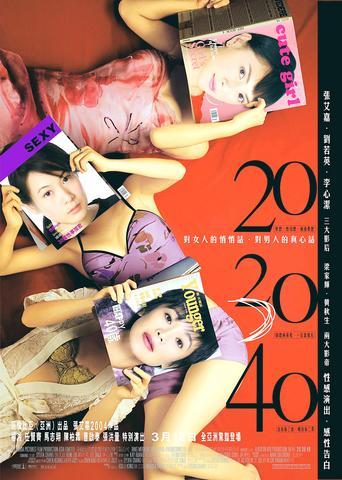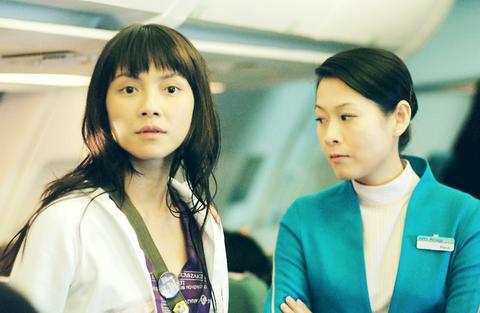Silvia Chang's (
One of the rare women filmmakers in Chinese-language films, Chang has managed to make a movie every two to three years since 1986. Apart from her directing work, she runs her own artist-management business, while once in a while still acting in a few Hong Kong movies and also releasing records as a singer. And every now and then, her so-called "chick movies" will come out as impressive surprises, such as this 2004 Berlin Film Festival entry, 20, 30, 40.

In keeping with the trend of romantic comedies trying to mirror Sex and the City or Bridget Jones' Diary, which honestly reveal the awkwardness, defeat and cruelty women face in the games of love, 20, 30, 40 movie offers a Chinese version on these by-now familiar themes.

PHOTO COURTESY OF COLUMBIA ASIA
20, 30, 40 meets its expectations, being an honest, cute, semi-feminist movie about women in Taipei.
The 30-something woman Hsiang-hsiang (Rene Liu (劉若英)) is a flight attendant torn between two men -- one a musician in New York, who is not mature enough to settle down, the other a mature doctor, but married. Hsiang-hsiang is always reminded of her mom's reasons for forcing her to learn piano. "One day your man will leave you, so at least you can teach piano."
The 40-something Lily (Silvia Chang) takes a flight tended by Hsiang-hsiang back to Taipei, with her husband and 17-year-old daughter. A happy wife and mother who owns a flower shop, Lily finds out about her husband's mistress and decides on an immediate divorce. On the same flight is Jie (Lee Sin-jie, (李心潔)), a 20-something Malaysian girl coming to Taiwan to become a singer. She is teamed up with a Hong Kong girl by a sloppy, down-on-her-luck producer-songwriter and she is unsure about her future.
The most honest and moving story between the three women is the 40-something Lily, portrayed by director Chang herself. Trying to prove that she's still attractive, she spends wild nights at Taipei's Carnegie's and dates a young man whose two obsessions are sex and sports, the former of which wears out her middle-aged bones.
As a director, Chang this time has a more open, easy and mature eye when looking at a woman's life, than her 1999 film Tempting Heart (心動), which was an equally touching, though slightly forced, story about a nostalgic romance. Lily's story generates the most laughs as well as tears.
Also impressive is Jie's story, performed and written by Lee Sin-jie, wth obvious autobiographical elements. An ambiguous feeling grows between Jie and Tung, the Hong Kong girl, who tries to seduce her. Jie is not sure if she's jealous when she sees Tung suddenly find a boyfriend. Also uncertain is her bumpy singer dream, because no one wants to make a record for the duo.
Rene Liu makes full use of her solid acting skills, but her story is a bit thinner than those of the other two women.
And as for men in this movie, no doubt they are minor characters, but Silvia Chang scored a casting coup, getting both Tony Leung Kar-fai (
20, 30, 40 may not be Silvia Chang's best movie so far, but it is by far the most honest and sincere work about women's loves and lives in Taipei.

Late last month Philippines Foreign Affairs Secretary Theresa Lazaro told the Philippine Senate that the nation has sufficient funds to evacuate the nearly 170,000 Filipino residents in Taiwan, 84 percent of whom are migrant workers, in the event of war. Agencies have been exploring evacuation scenarios since early this year, she said. She also observed that since the Philippines has only limited ships, the government is consulting security agencies for alternatives. Filipinos are a distant third in overall migrant worker population. Indonesia has over 248,000 workers, followed by roughly 240,000 Vietnamese. It should be noted that there are another 170,000

Enter the Dragon 13 will bring Taiwan’s first taste of Dirty Boxing Sunday at Taipei Gymnasium, one highlight of a mixed-rules card blending new formats with traditional MMA. The undercard starts at 10:30am, with the main card beginning at 4pm. Tickets are NT$1,200. Dirty Boxing is a US-born ruleset popularized by fighters Mike Perry and Jon Jones as an alternative to boxing. The format has gained traction overseas, with its inaugural championship streamed free to millions on YouTube, Facebook and Instagram. Taiwan’s version allows punches and elbows with clinch striking, but bans kicks, knees and takedowns. The rules are stricter than the

“Far from being a rock or island … it turns out that the best metaphor to describe the human body is ‘sponge.’ We’re permeable,” write Rick Smith and Bruce Lourie in their book Slow Death By Rubber Duck: The Secret Danger of Everyday Things. While the permeability of our cells is key to being alive, it also means we absorb more potentially harmful substances than we realize. Studies have found a number of chemical residues in human breast milk, urine and water systems. Many of them are endocrine disruptors, which can interfere with the body’s natural hormones. “They can mimic, block

Pratas Island, or Dongsha (東沙群島) had lain off the southern coast of China for thousands of years with no one claiming it until 1908, when a Japanese merchant set up a facility there to harvest guano. The Americans, then overlords of the Philippines, disturbed to learn of Japanese expansion so close to their colony, alerted the Manchu (Qing) government. That same year the British government asked the Manchus who owned the island, which prompted the Manchu government to make a claim, according to South China Sea expert Bill Hayton. In 1909 the government of Guangdong finally got around to sending